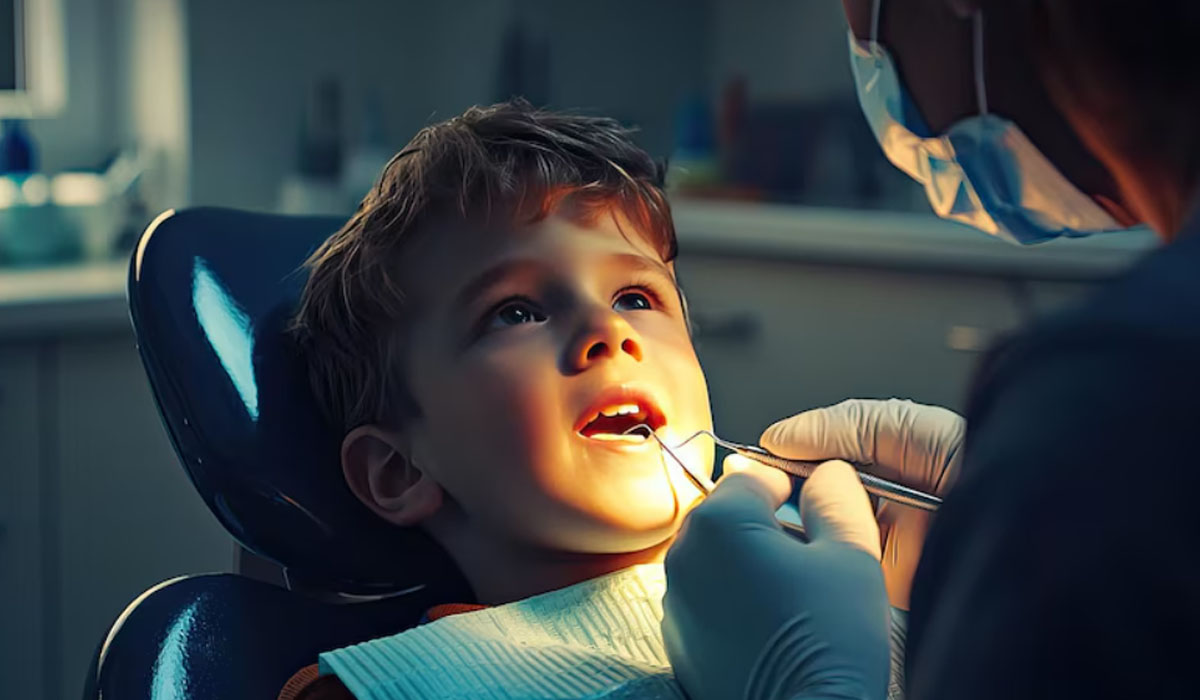Is Your Child’s Permanent Tooth Eruption Delayed? What It Could Mean and When to Act

Is Your Child’s Permanent Tooth Eruption Delayed? What It Could Mean and When to Act
What Should You Do if Your Child’s Teeth Are Delayed?
If your child’s permanent teeth are delayed beyond the typical timeline, it’s important to consult a pediatric dentist. Early detection of underlying issues can prevent more severe dental problems in the future. At NOVA Dental Hospital, we offer advanced diagnostic tools like X-rays and 3D scaning to identify the root cause of the delay.
For treatments requiring intervention, we provide laser-assisted procedures to reduce discomfort and speed up healing. We also offer nitrous oxide inhalation sedation, a safe and effective option to help your child stay calm and relaxed during dental procedures. This form of sedation ensures that your child’s experience is pain-free and anxiety-free, making it easier to address any necessary dental issues with minimal stress.
What is Delayed Permanent Tooth Eruption?
Delayed permanent tooth eruption occurs when a child’s adult teeth don’t come in according to the typical timeline. Usually, a child’s first permanent teeth (the molars) begin to emerge around age 6, with the rest of the teeth following through until about age 12. If your child’s teeth don’t fall within this general range, it may be a case of delayed eruption.
What Causes Delayed Permanent Tooth Eruption?
Delayed permanent tooth eruption can be alarming for parents, but understanding the various causes can help determine whether the delay is part of normal development or if it indicates a dental or health issue. Below are detailed explanations of the common causes of delayed permanent tooth eruption:
- Genetic Factors:
- Family history of delayed eruption: Genetics can play a significant role in determining when your child’s permanent teeth emerge. If one or both parents experienced delayed tooth eruption during childhood, it’s likely their children will experience the same. This type of delay is generally harmless and self-corrects over time.
- Natural variation: Some children simply develop at a different pace. If there are no signs of dental issues, delayed eruption could just be part of their unique growth timeline.
- Overcrowding or Impaction:
- Lack of space: Overcrowding occurs when there isn’t enough room in the jaw for all the teeth to erupt properly. This is particularly common if baby teeth are lost prematurely or if the jaw is too small to accommodate all the incoming permanent teeth.
- Tooth impaction: When a permanent tooth is “stuck” beneath the gum line and unable to erupt properly, this is referred to as impaction. Often, this happens when other teeth block its path, or if the tooth is misaligned. Impacted teeth may require surgical intervention or orthodontic treatment to resolve the issue.
- Crossbite or malocclusion: If the child’s bite is misaligned, such as in the case of a crossbite or underbite, it can prevent permanent teeth from erupting as expected.
- Endocrine Disorders:
- Hormonal imbalances: Conditions like hypothyroidism or hypopituitarism can slow down the body’s overall growth and development, including the eruption of teeth. These disorders impact the regulation of hormones that control the development of bones and tissues, leading to delayed dental development. Children with these conditions may also exhibit delayed growth, delayed puberty, or other signs of slow physical maturation.
- Growth hormone deficiencies: Children with low levels of growth hormones often experience delays in tooth eruption because their bodies are developing at a slower rate overall. In such cases, addressing the underlying hormonal imbalance can help normalize the rate of tooth eruption.
- Retained Baby Teeth:
- Failure of baby teeth to fall out: If a baby tooth doesn’t fall out when it should, it can prevent the permanent tooth from erupting in its place. Retained baby teeth may remain firmly rooted in the gums, blocking the adult teeth from emerging and resulting in crooked or misaligned teeth when the permanent ones eventually come through.
- Fusion or ankylosis of baby teeth: In some cases, a baby tooth may fuse with the underlying bone (a condition called ankylosis), making it more difficult for the tooth to fall out naturally. This can significantly delay the eruption of the corresponding permanent tooth and may require dental intervention, such as extraction.
- Early Shedding of Baby Teeth:
- Loss of baby teeth too soon: When baby teeth are lost prematurely—due to decay, injury, or extraction—the gums may heal in such a way that thickened tissue develops over the site. This thicker gum tissue can create additional resistance for the emerging permanent teeth, delaying their eruption.
- Thickened gum tissue: After premature loss of baby teeth, the body may respond by over-healing the area, leading to thickened skin or gingival hyperplasia. This can block the path of the permanent teeth, requiring minor surgical procedures or laser treatment to create an opening for the teeth to emerge.
- Nutritional Deficiencies:
- Calcium and vitamin D deficiency: The lack of essential nutrients, particularly calcium and vitamin D, can interfere with the normal growth of bones and teeth. Calcium is vital for the mineralization of teeth, and without sufficient levels, the formation of permanent teeth may be delayed.
- Phosphorus: Just like calcium, phosphorus plays an important role in the development of strong teeth and bones. A deficiency in this nutrient can lead to weakened or underdeveloped teeth, causing delays in eruption.
- Malnutrition: Children with poor diets or malabsorption disorders may also exhibit delayed eruption of permanent teeth due to the body’s inability to provide the necessary resources for normal tooth development.
- Developmental Disorders:
- Down syndrome: Children with Down syndrome often experience delays in various developmental milestones, including tooth eruption. Both baby teeth and permanent teeth tend to come in later than average. These children are also at a higher risk for dental complications such as crowding, impaction, and malocclusion.
- Cleidocranial dysplasia: This rare genetic disorder affects the development of bones and teeth. Children with cleidocranial dysplasia often have delayed or failed eruption of permanent teeth due to the abnormal formation of their jawbones and skull. They may also have extra teeth (supernumerary teeth), which further complicates the normal eruption process.
- Cleft palate: Children born with a cleft palate may also experience delayed or abnormal tooth eruption. The structural abnormalities in the mouth can create significant challenges for the natural progression of tooth development.
- Systemic Conditions:
- Chronic illnesses: Systemic diseases, such as celiac disease, diabetes, or kidney disease, can affect overall growth, including the development of permanent teeth. These chronic conditions may interfere with normal bone and tooth development, leading to delayed eruption.
- Radiation therapy: Children who undergo radiation treatment, particularly around the head and neck, may experience delays in tooth development. Radiation can impact the growth centers of the jaw and inhibit the normal eruption process.
- Trauma or Infection:
- Injury to baby teeth: Trauma to baby teeth can result in root damage or infection, leading to premature loss of the tooth. This can delay the eruption of the corresponding permanent tooth, especially if the gum tissue heals improperly.
- Oral infections: Infections like abscesses or gum disease can damage the developing permanent teeth beneath the gums, potentially delaying their eruption. Chronic infections can also result in thicker scar tissue, further obstructing the path of the adult teeth.
Signs to Watch For
It’s important to recognize when delayed tooth eruption may be a cause for concern. Some signs to look out for include:
Signs of Delayed Permanent Tooth Eruption
- No permanent teeth by age 7 or 8: If your child’s permanent teeth haven’t started to emerge by this age, it may indicate a delay. This is typically the time when the first molars and incisors begin to erupt.
- Retained baby teeth: If your child’s baby teeth are not falling out when expected, they could be blocking the permanent teeth from erupting properly. This may require intervention to remove the retained baby teeth and allow the adult teeth to come through.
- Early shedding or decayed baby teeth: If baby teeth are lost prematurely due to decay or injury, the gum tissue may heal too thickly, forming a barrier that can prevent the proper eruption of permanent teeth. Decayed baby teeth may also block the normal path of adult teeth, delaying their eruption.
- Asymmetry: If one side of the mouth is developing normally while the other is delayed, this could be a sign of impaction or other issues. In such cases, X-rays can help diagnose the problem.
- Visible signs of crowding: If your child’s mouth appears crowded or if there seems to be insufficient space for new teeth to emerge, it might be necessary to intervene. Crowding can delay or prevent the permanent teeth from erupting in their correct positions.
Potential Impact of Delayed Permanent Tooth Eruption
While delayed tooth eruption is often harmless, leaving it unaddressed can lead to other issues down the road, including:
- Misalignment: Teeth that don’t emerge in the correct order or on time can lead to crowding, shifting, and bite issues. This may result in the need for orthodontic treatment like braces.
- Jaw Development: Proper tooth eruption plays a role in the development of the jaw. Delayed teeth can affect the growth and positioning of the jaw, which can lead to more extensive treatment later.
- Speech or Chewing Difficulties: Teeth are essential for proper speech and chewing. A delay in permanent teeth could impact these functions, affecting your child’s day-to-day activities.
- Increased Risk of Cavities or Gum Disease: When baby teeth stay in the mouth too long, they are more likely to decay or cause gum issues, which can lead to infections or other complications.
Diagnosis and Evaluation at NOVA Dental Hospital
At NOVA Dental Hospital, we take delayed tooth eruption seriously and offer a comprehensive diagnostic process to determine the cause and best course of action. Here’s what you can expect:
- Detailed Medical and Dental History:
- We start by gathering a complete history to understand any potential genetic factors, health issues, or prior dental concerns that may be affecting tooth eruption.
- Thorough Oral Examination:
- Our dental team will examine your child’s mouth to check for signs of retained baby teeth, crowding, or impacted teeth that may be preventing proper eruption.
- Advanced Imaging:
- Using our Vatech X-ray machines, we take high-quality images to see exactly where the unerupted teeth are and whether there are any obstructions. This imaging allows us to detect impacted teeth, bone issues, or other factors contributing to the delay.
- Consultation with Specialists:
- If we suspect underlying medical conditions like hormonal imbalances or systemic health issues, we may refer your child to a pediatrician or endocrinologist for further testing.
Treatment Options for Delayed Permanent Tooth Eruption
Depending on the cause of the delayed eruption, we offer several treatment options at NOVA Dental Hospital:
Treatment Options for Delayed Permanent Tooth Eruption
- Monitoring and Observation:
- In many cases, no immediate treatment is necessary. We may simply monitor your child’s dental development and ensure that the permanent teeth eventually emerge on their own. Regular check-ups allow us to track progress and intervene only if necessary.
- Space Maintainers or Orthodontics:
- If overcrowding is an issue, early orthodontic treatment such as space maintainers or braces may be recommended to create space for the incoming permanent teeth. This approach helps guide teeth into their proper positions and prevents future dental complications.
- Surgical Intervention:
- In cases of impacted teeth that cannot emerge on their own, a minor surgical procedure may be needed to expose the tooth. At NOVA Dental Hospital, we use an OT-style dental chair setup, ensuring a sterile and comfortable environment for such procedures. This advanced setup provides a smooth and safe surgical experience, especially for young patients.
- Removal of Baby Teeth:
- If retained baby teeth are causing the delay, we may need to extract the primary teeth to clear the path for the permanent teeth to come in. This procedure is done gently, ensuring minimal discomfort for your child.
- Laser Treatment for Thick Tissue Removal:
- In cases where early shedding or decayed baby teeth cause thickened gum tissue, preventing the eruption of permanent teeth, laser treatment can be used to remove the excess tissue. This procedure is precise, minimally invasive, and helps create a clear path for the permanent teeth. Lasers reduce bleeding, promote faster healing, and make the procedure more comfortable for children.
- Addressing Systemic Issues:
- If the delay is caused by an underlying health issue such as hypothyroidism, nutritional deficiencies, or other systemic conditions, we will work closely with your child’s healthcare provider to address these problems. Proper management of these conditions can promote healthy dental development and prevent further delays.
Why Choose NOVA Dental Hospital for Your Child’s Dental Care?
At NOVA Dental Hospital, we understand how concerning delayed tooth eruption can be for parents. That’s why we provide expert care, advanced technology, and a comfortable, child-friendly environment to ensure the best outcomes for your child.
- Expert Pediatric Dentistry: Led by Dr. Happy Patel, our team specializes in treating children and ensuring their dental development is on track.
- Advanced Equipment: We use cutting-edge diagnostic tools like Vatech X-rays and nitrous oxide inhalation sedation for anxious children, making every visit smooth and comfortable.
- Comprehensive Care: Whether your child needs monitoring, orthodontic treatment, or surgery, we offer a full range of services to ensure their teeth develop properly.
Conclusion
Delayed permanent tooth eruption isn’t always a cause for alarm, but it’s important to understand the potential causes and impact. Early diagnosis and intervention can help prevent complications such as misalignment, jaw development issues, and dental infections.
If you’re concerned about your child’s permanent teeth not coming in on time, don’t wait—schedule a consultation with NOVA Dental Hospital today. Our expert team will work with you to ensure your child’s smile is healthy, bright, and on track for the future!










